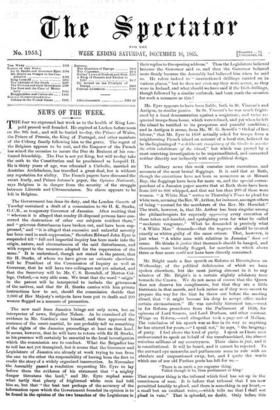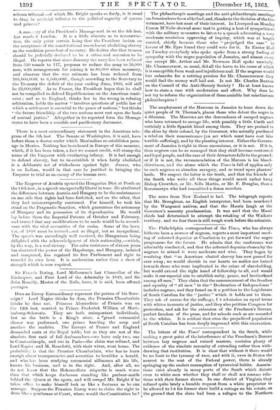Mr. Bright made a fine speech on Reform at Birmingham
on- Wednesday, of the political deficiencies of which we have spoken elsewhere, but the most jarring element in it to any admirer of Mr. Bright's is a certain slightly adulatory tone towards the Crown. We do not mean of course that the Queen does not deserve his compliments, but that they are a little histrionic in that mouth, and look rather as if they were meant to prepare the way for the hint he threw out before the meeting closed, that "it might become his duty to accept office under certain circumstances." He was carefully historical too,—went in for Reform precedents from the Parliament of 1628, for opinions of Lord Somers, and Lord Durham, and other etninent Whigs on Reform,—and altogether took a page out of Ilallatn. The conclusion of his speech was as fine in its way as anything he has uttered for years,—" I speak not," he says, "the language of party. I feel above the level of party. I speak as I have ever endeavoured to speak on behalf of the unenfranchised, the almost voiceless millions of my countrymen. Their claim is just, and it is constitutional. It will be heard, and it cannot be rejected. To the outward eye monarchs and parliaments seem to rule with an absolute and unquestioned sway, but, and I quote the words which one of our old Puritan poets has left for us,— ' There is on earth a yet auguster thing, Veiled though it be, than parliament or king.'
That auguster thing is the tribunal which God has set up in the consciences of men. It is before that tribunal that I am now permitted humbly to plead, and there is something in my heart,— a small but an exultant voice,—which tells me that I shall not plead in vain." That is splendid, no doubt. Only before this
to drag in artificial tributes to the political sagacity of queens and princes ?



































 Previous page
Previous page